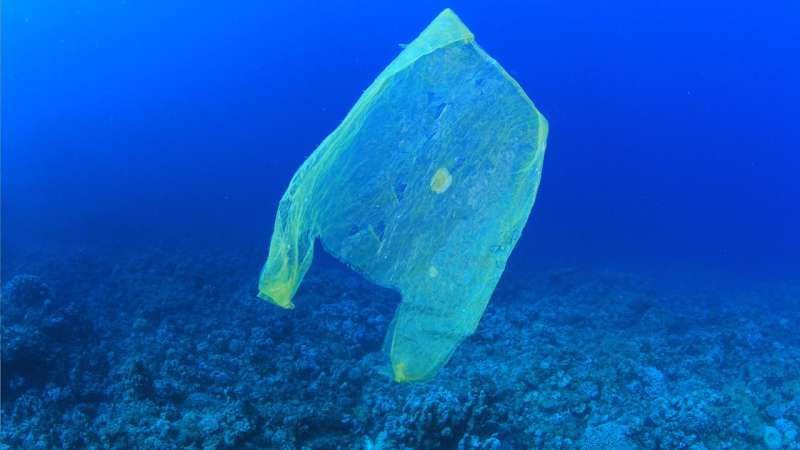The battle to ban plastic bags

There are increasing concerns in our day-to-day lives.
Single-use plastics of any kind, including grocery bags, cutlery, straws, polystyrene and coffee cups, are significant yet preventable sources of plastic land-based and marine pollution.
In Canada, bans on plastics have so far been left up to municipalities, and some are taking action. and in stores, with business owners subject to huge fines if caught providing these to customers.
Other municipalities and provinces, such as Halifax and Nova Scotia, are contemplating similar bans in the wake of on the import of certain recyclable products.
Although regulations are cropping up in some places, increasing public awareness appears to be gaining widespread momentum globally and across Canada.
Polystyrene also a target
National and regional plastic bag bans have been in Asia, Europe, Australia and North America.
But plastic bags are not the only single-use plastic items being targeted —polystyrene is on the hit list as well. Food businesses in Washington, D.C. and San Francisco .
In Maine, the Brunswick Town Council voted unanimously to ban polystyrene food containers. All retailers, restaurants and vendors .
But even though banning single-use plastic using legislative interventions is significant, not everyone is convinced of its effectiveness.
In Canada, some players are taking their own steps using non-legislative strategies to reduce plastic use, regardless of government policy. In 2009, Loblaws, Canada's largest grocer, on plastic grocery bags.
this unassuming action has diverted billions of plastic bags from our landfills and oceans over the last nine years. In February 2016, and began charging customers a five-cent fee for plastic bags across all Walmart stores in Canada.
Reservations about banning plastic bags
Public sentiment on climate change and environmental stewardship has changed significantly over just the last few years as more Canadians expect industry to act. But some still have reservations.
Some have claimed that plastic bags serve an important food safety function from harmful bacteria, outbreaks and food-borne illnesses, although those findings have
suggested that the combination of reusable grocery bags and food is risky. According to the study, coliform bacteria and Escherichia coli (E. coli) were found in half of the reusable grocery bags sampled because people were neglecting to launder them often enough.
The study was, however, funded by a trade group representing the interests of plastic bag manufacturers.
The Mercatus Center in the United States, a conservative think tank with Charles Koch on its board, has said given the insignificant variance in carbon footprint between bagging alternatives, including paper bags.
And data from the U.S. Environmental Protection Agency suggest

These groups appear to be suggesting that banning the use of plastic bags is more about appearances and idealism than about protecting the environment.
Toronto rescinded its ban
Clearly banning plastic bags is a divisive issue. The resistance is real, and several cities have been hesitant to move forward on legislation; some plastic bag legislation has even been rescinded.
Toronto once had a five-cent levy for plastic bags, and an outright ban on plastic bags was sought in 2012,
Plastic bags are a convenience, and habits are hard to break. What could potentially be an inconvenience to food shoppers can, and in some cases has, become a political hot potato to those in public office.
But the problem will not go away given the planet is currently drowning in plastic pollution. estimates that at least 5.25 trillion plastic particles weighing 268,940 tonnes are currently floating in our oceans. Even these staggering numbers pale when compared to the
Most of us cannot see the problem, but it is out there. While some trash skimmers capable of removing floating debris in marinas and harbours achieve modest success, a global clean-up is next to impossible with current technology.
The situation is being made worse by countries like Canada. Its food industry continues to generate more waste from single-use plastic food packaging every year.
More Canadians living alone
Given that more than 28 per cent of all , and the number of Canadians living alone is going to continue to grow, the single-serve economy will likely expand as well, especially in food.
This means that the use of single-use plastic packaging and containers could increase at alarming rates.
Banning plastics is one swift way to deal with the issue, and offer a temporary path to more impactful, sustainable strategies.
may be the future and could be a convenient solution for all concerned. More and more can be used to manufacture bio-plastics. Algae and shrimp shells are some examples.
To tackle the issue of , an increasing number of them sold in Canada are made of coffee shafts and are compostable, but
Recently, a Dutch supermarket chain . This project was only made possible by using innovative solutions to plastic packaging. You will find only biodegradable flexible bioplastic packaging and bags in the store. The challenge with these alternatives, of course, is the cost.
. But given how rapidly the narrative around climate change is shifting, the "green" premium is increasingly worthy of consideration by industry.
Once supply chains mature and become more developed to allow more access to affordable feedstocks, production costs and end prices for bioplastics will likely drop as well.
The notion of reduce, reuse, recycle has been preached for years now. Outright bans fit well within such a paradigm.
But the concept of replacing single-use plastics requires a revolution in consumer mentality. And so a much more interesting challenge is that of keeping grocery shopping from becoming either a burden on the environment or an inconvenience to customers.
Provided by The Conversation
This article was originally published on . Read the .![]()

















